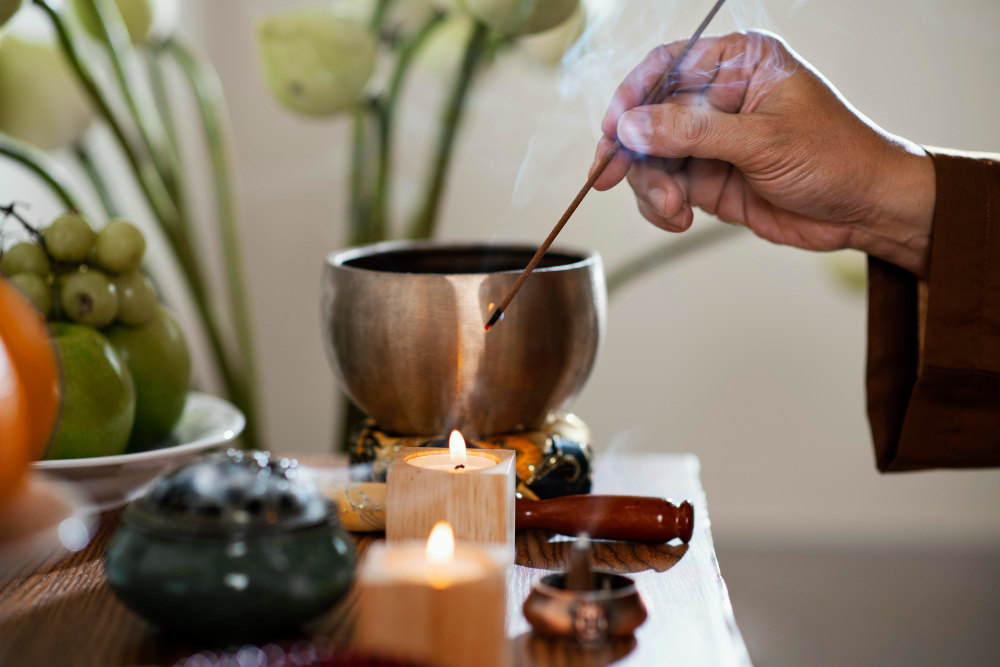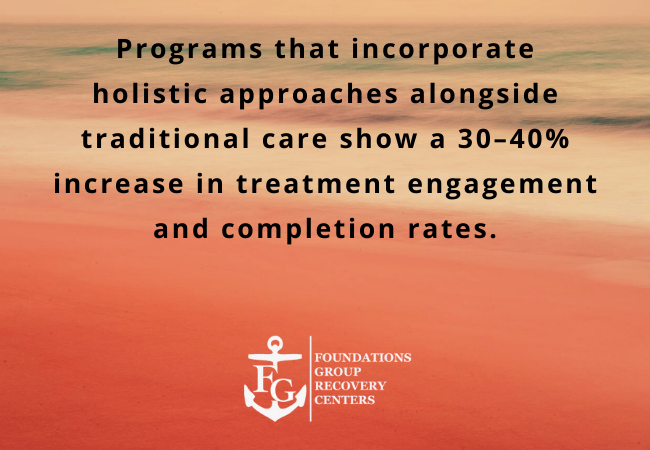Recovery from addiction isn’t just about removing substances—it’s about rebuilding your life, mind, body, and spirit. While traditional clinical methods provide the structure and tools to overcome substance use, holistic therapies bring in the emotional, physical, and spiritual healing necessary for full recovery.
At Foundations Group Recovery Centers, we’ve seen firsthand the transformational impact of blending both modalities. Our Holistic Addiction Treatment Program in Massachusetts is designed to help you find real balance—by treating more than just the symptoms of addiction.
Whether you’re stepping down from a residential program or beginning care in a Half Day Treatment Program in Massachusetts, a combined approach empowers you to heal on every level.
Why Balance Is Essential in Addiction Recovery
Addiction often stems from a complex web of causes: unresolved trauma, chronic stress, mental health disorders, social isolation, and emotional disconnection. While traditional treatment addresses clinical symptoms, holistic care helps clients process pain, reconnect with purpose, and learn how to live well without substances.
A truly effective Addiction Treatment Program in Massachusetts doesn’t treat addiction as a standalone issue—it supports the whole person.
Recovery balance means:
- Addressing both mental health and physical health
- Building both coping skills and emotional resilience
- Replacing harmful behaviors with nourishing ones
- Treating trauma while fostering mindfulness and self-acceptance
That’s the heart of our treatment model at Foundations Group.
What Traditional Addiction Treatment Includes
Traditional treatment methods form the foundation of most structured substance use treatment programs in Massachusetts. These evidence-based therapies are backed by decades of clinical research and are essential for helping individuals understand, manage, and recover from addiction.
Clinical & Evidence-Based Services:
- Cognitive Behavioral Therapy (CBT): Targets the thought patterns that lead to addictive behavior
- Dialectical Behavior Therapy (DBT): Helps clients manage distress, regulate emotions, and improve relationships
- Motivational Interviewing (MI): Enhances internal motivation for change
- Trauma-Informed Therapy: Supports healing for those with PTSD, abuse histories, or chronic stress
- Group and Individual Therapy: Promotes peer connection and individualized progress
- Medication-Assisted Treatment (MAT): Supports recovery from opioids or alcohol with FDA-approved medications
- Psychiatric Evaluations & Dual Diagnosis Support: Essential for clients with co-occurring disorders
These modalities are foundational in both Outpatient Addiction Treatment in Massachusetts and our Day Treatment Programs in Massachusetts, helping clients address both surface symptoms and root causes.
What Holistic Addiction Treatment Adds to the Equation
Holistic addiction treatment goes beyond talk therapy and medication. It introduces therapies that focus on self-discovery, emotional regulation, and inner peace. These methods are rooted in ancient healing practices, integrative wellness, and trauma-informed care.
Common Holistic Therapies We Offer:
- Yoga Therapy: Supports physical detoxification, flexibility, and body awareness
- Meditation and Breathwork: Builds mindfulness, reduces anxiety, and enhances self-control
- Nutritional Counseling: Rebalances the body after years of poor diet or substance depletion
- Art and Music Therapy: Encourages emotional expression in non-verbal forms
- Nature-Based Therapy: Promotes grounding, calmness, and reflection through time outdoors
- Reiki or Energy Work: Encourages emotional and spiritual balance (when requested)
- Massage or Acupuncture (as available): Addresses physical stress, muscle tension, and pain
Incorporating these therapies into our Holistic Addiction Treatment Program in Massachusetts helps clients build a new relationship with themselves—one centered on self-care, resilience, and connection.
Why Combining Traditional and Holistic Approaches Works
When you combine traditional and holistic methods, you treat both the underlying causes and outward behaviors of addiction. It’s like using both a flashlight and a compass—you need tools to navigate where you are and guidance for where you’re going.
Here’s how these methods complement each other:
| Traditional Treatment | Holistic Therapy | Combined Benefit |
|---|---|---|
| CBT and DBT | Mindfulness & Meditation | Improves emotional regulation and present-moment awareness |
| Group Therapy | Art or Music Therapy | Builds connection and offers emotional release |
| Trauma Counseling | Somatic Practices (yoga, breathwork) | Heals both mental and physical trauma responses |
| Medication-Assisted Treatment (MAT) | Nutrition + Body Movement | Supports overall wellness and reduces dependency symptoms |
| Clinical Assessment and Diagnostics | Energy or Spiritual Exploration | Encourages healing on a deeper, more personal level |
Clients in our Half Day Treatment Program in Massachusetts receive these benefits daily—learning how to manage their addiction while actively healing mind, body, and spirit.
How to Personalize Your Recovery Plan with Both Approaches
No two recovery journeys are the same. That’s why integrating holistic and traditional methods works best when tailored to your specific needs, history, and preferences.
At Foundations Group Recovery Centers, we collaborate with each client to create a personalized recovery plan that considers:
-
Your substance use history and mental health needs
-
Your lifestyle, cultural background, and spiritual beliefs
-
Your goals for physical wellness, emotional healing, and long-term sobriety
Whether you’re more drawn to CBT and medication management, or yoga and meditation, our team helps you build a plan that works for you—without forcing a one-size-fits-all approach.
The result? A recovery experience that feels authentic, empowering, and sustainable.
What the Research Says: The Science Behind Integrated Treatment
More treatment centers are integrating holistic care—and for good reason. Scientific studies are increasingly showing that combined approaches lead to better outcomes.
-
Mindfulness-based relapse prevention (MBRP) reduces relapse risk by increasing emotional awareness and self-control
-
Yoga and breathwork help regulate the nervous system and reduce symptoms of anxiety, depression, and PTSD
-
Art and music therapy have been linked to reduced cravings and improved emotional expression
-
Nutrition and exercise improve brain chemistry and support physical healing from long-term substance use
These methods, when paired with evidence-based traditional treatment, not only help people get sober—but stay sober.
How This Works in Practice at Foundations Group
Our combined approach is integrated across every level of care at Foundations Group Recovery Centers. From Alcohol & Drug Detox in Massachusetts to our Day Treatment Programs, clients are guided by both licensed clinicians and holistic practitioners.
A Typical Day Might Include:
- Morning: Group CBT session focused on relapse prevention
- Midday: Mindful meditation and trauma-informed yoga
- Afternoon: Individual counseling with a licensed therapist
- Late afternoon: Art therapy or journaling session to process emotions
This balance allows for both clinical progress and inner transformation—two things essential for long-term recovery.
Benefits of Integrating Holistic and Traditional Care
Treats the Whole Person
Addiction affects your brain, body, emotions, relationships, and sense of self. Holistic care fills in the gaps left by clinical-only programs.
Promotes Long-Term Sobriety
Learning meditation, yoga, and creative expression provides lifelong tools for managing stress and triggers.
Enhances Emotional Resilience
Clients learn to sit with discomfort, tolerate distress, and find calm—without needing substances to escape.
Reduces the Risk of Relapse
Clients equipped with both cognitive skills and embodied practices are less likely to turn back to old behaviors under pressure.
Who Benefits Most from a Combined Approach?
A dual-track program is ideal for individuals who:
- Are recovering from long-term substance use
- Struggle with trauma, anxiety, depression, or chronic stress
- Have had limited success with traditional-only rehab
- Prefer experiential or body-based therapies
- Are seeking deeper meaning, connection, or purpose in recovery
No matter where you’re starting, our Addiction Treatment Center in Massachusetts can build a plan that meets your needs.
Why Choose Foundations Group Recovery Centers?
We believe recovery should empower you—not limit you. That’s why our programs don’t just treat addiction—they foster transformation. At Foundations Group, you’ll find:
- Licensed clinical therapists and holistic practitioners
- Customized treatment plans tailored to your goals
- Daily structure and flexibility through outpatient and day treatment
- On-site wellness activities, creative therapies, and movement classes
- A nurturing environment where your whole self is welcome
Whether you’re beginning treatment or transitioning from a higher level of care, our Addiction Treatment Programs in Massachusetts are designed to help you not just get sober—but stay well.
Conclusion
Healing from addiction isn’t just about eliminating a substance—it’s about restoring balance to your entire life. By combining the proven power of traditional therapies with the depth and self-connection of holistic care, you create a recovery journey that’s not only effective but personally meaningful.
At Foundations Group Recovery Centers, we believe that real change happens when the whole person is treated—mind, body, and spirit. That’s why our integrative programs offer the best of both worlds: clinical structure to address addiction and holistic support to nurture growth, peace, and purpose.
Whether you’re just beginning your journey or stepping down from higher levels of care, our Holistic Addiction Treatment Program in Massachusetts is here to help you reclaim your life with strength, clarity, and compassion. Call us today at 844.763.4966 to speak with our admissions team and start building a recovery plan that supports every part of who you are. Your recovery deserves more than treatment. It deserves transformation.
Frequently Asked Questions (FAQ)
What is holistic addiction treatment?
Holistic addiction treatment refers to therapies that address the physical, emotional, and spiritual aspects of recovery. This may include yoga, meditation, nutrition counseling, art therapy, and mindfulness practices. At Foundations Group, holistic care complements clinical therapy to support full-person healing.
How does holistic treatment differ from traditional therapy?
Traditional therapy focuses on evidence-based practices like CBT, DBT, and medication. Holistic therapy adds body-centered, creative, and spiritual approaches to help individuals manage stress, express emotion, and heal on a deeper level.
Can I receive both types of treatment at the same time?
Absolutely. At Foundations Group Recovery Centers, we integrate both holistic and traditional treatments in our Half Day Treatment Program in Massachusetts and other levels of care. This ensures a comprehensive and personalized approach to recovery.
Is holistic treatment backed by science?
Yes. Practices like mindfulness, yoga, nutrition, and expressive arts therapy have been studied and shown to improve emotional regulation, reduce anxiety, and support sustained recovery. They’re not alternatives to traditional therapy—they enhance it.
What are the benefits of combining traditional and holistic treatments?
When used together, these approaches help you:
-
Address addiction on multiple levels (mental, physical, emotional)
-
Build lifelong coping skills
-
Strengthen your mind-body connection
-
Increase your chances of long-term sobriety


